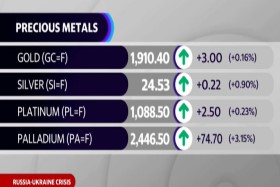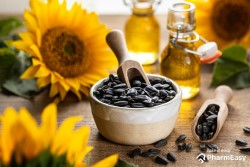Russia launched a full-scale land, air and sea invasion of Ukraine on Thursday, the worst attack on another European country since World War II.
Russia and Ukraine produce 10 percent of the world's oil, one-third of Europe's natural gas, 29 percent of the world's wheat exports, 80 percent of the world's sunflower oil exports, and 19 percent of the world's corn exports.
Russia has a 40% market share of palladium, making it the world's largest supplier. 10% of global nickel supply and 6% of aluminium supply come from the country.
Oil prices topped $105 a barrel for the first time since 2014, natural gas prices in the U.K. and the Netherlands jumped 40% to 50%, wheat rose to a near decade high, corn hit an eight-month high and aluminum hit a record high.

Gold and palladium prices both surged to seven-month highs, while palladium touched levels not seen in nearly 18 months as investors sought safe havens.
Several markets reversed after the U.S. imposed new penalties on Russia. Oil prices fell after Vice President Joe Biden said the United States was working with other countries to release more oil from the world's strategic petroleum reserves. The U.S. threatened to take further action.
“Whether Russian energy exports will also be affected by sanctions raises many questions. Just two days ago, the U.S. ruled that out.
Commodity exports from Russia could also be affected if buyers are unable to open letters of credit from Western banks to finance purchases.
Western banks appear to be unable to secure letters of credit for Russian oil from at least three major buyers.
In contrast, Russia's state-owned gas monopoly Gazprom said gas supplies through Ukraine were operating normally, and Ukraine said its energy infrastructure had not been affected.
Russia's Black Sea ports, which account for the vast majority of grain and oilseed exports, remain open despite the Russian government's suspension of shipping in the Sea of Azov.
An estimated 2 to 3 percent of the world's oil supply is transported through the Black Sea from Russia and Kazakhstan, as well as Azerbaijan and Turkmenistan.
Rusal is the world's largest aluminum producer outside of China, and its products are transported through the Black Sea. RUSAL's production accounts for 6% of the world's total.
Analysts at Natixis warned that "metal prices could take a serious hit" if the West imposes sanctions or if Russia "arms" its metal exports. A number of companies have stopped agricultural processing and closed Ukrainian port terminals, including Coca-Cola bottler Carlsberg and Bunge and Archer Daniels Midland.

Cocoa and coffee prices fell as investors turned to safer assets such as gold, according to traders. Global vegetable oil supplies from sunflower-producing regions pushed soybean oil futures to record highs.
Wheat futures surged above the daily trading limit of 50 cents to their highest level since mid-2012, according to CME Group data.